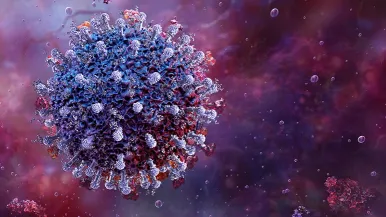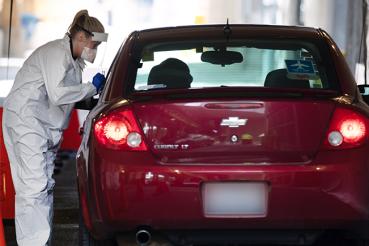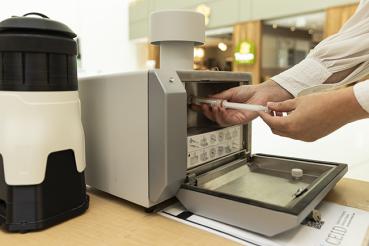Five years after the pandemic began, COVID-19 is still with us, causing anywhere from mild symptoms to serious illness.
While there are far fewer severe infections today than during the pandemic, COVID can make you miserable and put you in bed for a few days. It also can lead to a serious or fatal illness.
“COVID is less likely to cause severe illness now, but it still makes people sick and can be serious for those at higher risk,” said Michael Lin, MD, Rush epidemiologist.
COVID-19 is “endemic,” meaning people continue to get it, but it spreads more at some times than others. So far, COVID has not followed a simple seasonal pattern the way flu, RSV and other respiratory illnesses often do, but the number of infections pick up when people spend more time inside, gather in large groups or travel, which is common in the fall and winter.
Preventing flu, COVID and RSV
Vaccines remain one of the most effective tools for preventing serious illness, protecting people who are at greater risk of illness and reducing the spread of disease, Lin said. There are safe and effective vaccines to prevent flu, COVID-19 and RSV, among other viruses.
“What protects you from COVID also helps with other viruses such as the flu: masking, avoiding crowds, and staying up to date on vaccines,” Lin said. “COVID vaccines work, especially in preventing serious infections.”
Updated COVID-19 and flu vaccines for 2025-2026 season have been approved this year and, as in the past, are being offered by some pharmacies, doctors’ offices and public health departments.
RSV, short for respiratory syncytial virus, affects people of all ages and is so common that nearly all children will have it before they are 2 years old. While mild in the great majority of cases, it can be severe in infants, older adults and people who have asthma, heart and lung disease, compromised immunity and other health conditions or are living in a long-term care facility. Since 2023, new options have been available to prevent it: a vaccine for adults and a preventive medication called nirsevimab for infants.
Who should get which vaccines?
Rush’s immunization recommendations are aligned with the Illinois Department of Public Health and national professional societies:
Flu vaccine, each fall and winter:
- Everyone age 6 months and older.
COVID-19 vaccine, once a year:
- All adults and all children ages 6 to 23 months
- Children ages 2 to 17 years who are themselves at risk (or, live in a household with others at risk) of serious illness, and children whose parent or guardian wants them to receive a vaccine through shared clinical decision-making.
- Individuals who are pregnant, planning to become pregnant or breastfeeding. Pregnant individuals are at risk of severe complications from COVID-19 infection. The vaccine can help protect a baby in the first 6 months of life.
Note: If you’ve had COVID-19 infection in the past few months, discuss when to get the vaccine with your doctor.
RSV immunization:
- One time, any time, for everyone 75 years and older, and those 50-74 years old who have increased risk for a severe infection.
- In the fall or winter: Pregnant individuals at 32-36 weeks’ gestation; infants up to 8 months old who don’t have protection through their mother’s vaccine. Children 8 to 19 months old who are at increased risk of severe illness as they enter their second fall or winter RSV season.
Why every year?
While some vaccines are needed only once, the flu vaccine is adjusted each year to target the strains that are being seen the most or expected to be the most common.
Similarly, SARS-CoV-2 is constantly evolving, which is why COVID-19 is still with us. The strain of SARS-CoV-2 that has been the most common in 2025 is called the XFG variant, or by its nickname, Stratus. It is a combination of two earlier variants that make it spread slightly more easily, but with similar symptoms.
Testing and Treatment
If you have symptoms or think you may have COVID, you need to know as soon as possible, both for your health and to protect others. You can find out if you have the virus by taking an over-the-counter test at home or getting a lab test, which some health clinics and pharmacies offer. At-home tests give a quick result and are accurate. But lab tests are more reliable and may detect the infection sooner, even before you have symptoms. That’s important if you are at risk of having a severe case, because treatments are available, but work best in the first days of infection.
For COVID, antiviral medications such as Paxlovid (nirmatrelvir/ritonavir) reduce symptoms and may prevent severe illness, hospitalization and death in high-risk patients. You should ask your primary care provider whether you would benefit from antiviral treatment.
The flu can put you in bed for days and make you miserable. It also can be serious.
If you come down with COVID-19 or the flu, you need to take care of yourself. That means:
- Getting plenty of rest and staying in bed as needed
- Drinking plenty of fluids
- Taking ibuprofen or acetaminophen for aches or fever
- Monitoring for symptoms like shortness of breath
If you have a fever or feel poorly, you may want to connect with your doctor or get virtual or in-person urgent care. Learn more about Rush Connect.
Protecting Yourself and Others
To prevent making other people sick when you have COVID or another respiratory virus, you should stay home at least until you are without a fever for 24 hours without taking fever-reducing medicine and your symptoms are getting better overall. You can then go back to normal activities but with added precautions over the next 5 days (including wearing a well-fitting mask). Note that different isolation rules apply to people who have COVID-19 and who work in certain fields, such as health care. Check with your employer or your employee health department for work-specific guidance.
Whether you are sick or not, you can reduce the chance of spreading viruses by washing your hands, not touching your eyes, mouth or nose and wearing a mask when you are in a crowded space.




